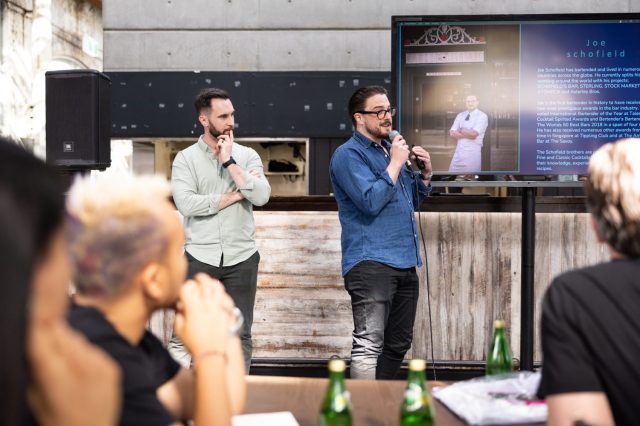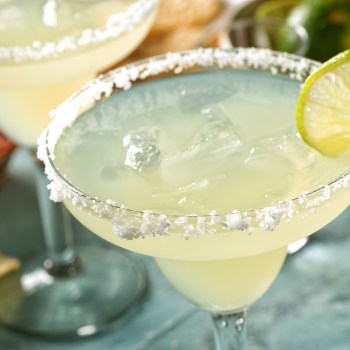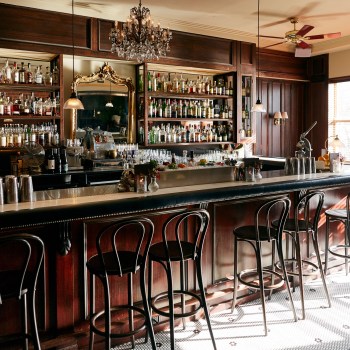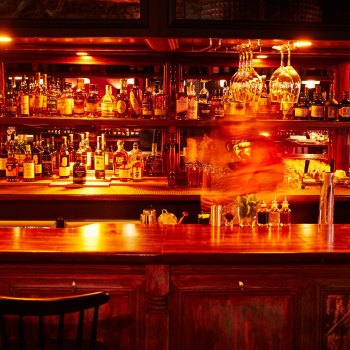Bars are often eager to talk about their well-stocked backbar, carefully curated menu or exciting entertainment offering – but there’s surprisingly little conversation about the first element of a venue that guests experience: the door itself.
The door was the focus of a masterclass hosted by Joe Schofield (of Schofield’s Bar in Manchester) at the recent Maybe Masterclasses showcase. Joe was the first bartender in history to be voted the International Bartender of the Year at the Tales of the Cocktail Spirited Awards, and the Bartender’s Bartender of the Year at the Worlds 50 Best Bars in 2018, receiving both titles within four months.
“For us, the door of a venue is one of the most important aspects of a hospitality experience,” Joe says.
“We’re talking about something that we truly believe is incredibly important from a hospitality perspective.”
Joe was joined on stage by Eamonn McElroy, previously Head of Security at Schofield’s, to discuss door policy and security from the viewpoint of keeping customers and colleagues safe and ensuring a positive atmosphere within the venue.
Eamonn is perhaps the most well-qualified door supervisor a venue could hope for. Prior to entering the hospitality sector, Eamonn had served for seven years as a soldier in the Irish Defence Force, before taking a bodyguard licence in London.
“Unfortunately, the pandemic hit and I found myself in Manchester without a job. Luckily enough, these guys opened their bar, we fell in touch and I was there for two years,” Eamonn said.
“It was probably the best two years of my life… To bring what I learned from a bodyguard perspective, from an army perspective, to work with these guys, was incredible.”
Over the course of the session, Eamonn and Joe provided guidance and training on how to resolve potential conflicts that can occur in bars, before concluding with some self defence techniques.
“These techniques aren’t designed to encourage violence, but hopefully may provide a tool that you need if you ever find yourself in a very challenging situation,” Joe said.
Why the door is more than just security…
“We champion the values of an exceptional hotel bar… and how the door, and your door supervisor, can really play into that warm hospitality, approachable luxury,” Joe explained.
“For me, the door is extremely important because you set the tone for the guest experience.
“I’ve never been a big fan of the way that you protect a venue perhaps, by being a speakeasy. I love visiting speakeasy bars, but for us, we wanted someone stood there, with a smile on their face, to really set that tone for what the experience was all about,” Joe continued.
“When it comes to Eamonn’s role it’s very important to make sure these people act as a host, and not a gatekeeper.”
Joe explained that Eamonn and his colleagues were far more than just bouncers – they were trained to take guests to their seats, to engage guests positively and to take payments. Eamonn even managed to get his own cocktail on the menu at Schofield’s.
One of the issues facing Schofield’s is not ensuring they have enough guests, but handling how they turn people away. The bar is a small venue of only 55 covers, with the largest table seating only six patrons, and is oversubscribed most nights.
“If you ever look at our negative reviews on Google or TripAdvisor, you’ll find that 99 per cent of it is because we were too busy for people to come in,” Joe said.
Joe explains how he and his team turns this experience into a positive.
“We do our very best to kill them with kindness and appreciate the time they took to come in. We have small maps that direct people to our other venues. We have a group chat where we communicate, so people can expect to be greeted at the other bar by another door supervisor.
“Eamonn will drop one of our colleagues a message, saying: ‘Four ladies, named Margaret, coming up in a pink jacket.’ As soon as they see a lady in a pink jacket: ‘Margaret! How are you? Welcome, sorry they didn’t have space for you in Schofield’s bar, come on in to Sterling [another Schofield venue].’”

… But why security is crucial
Nevertheless, both Joe and Eamonn stressed the importance of security for allowing a safe environment for staff, and for guests to enjoy the hospitality experience. With bars, security is particularly vital, simply because of the consumption of alcohol.
“The door is extremely important because this is this how you protect your colleagues, how you protect your guests,” Joe commented.
“We control the room with the door. We make sure that no intoxicated or aggressive guests enter the room. Once people are over that threshold, it is so much harder to get these people out.
“If you stop them at the door, that’s where the issue ends. If they get in, that’s where the issue will continue and perpetuate.”
Joe believes that creating that sense of security means that the owners and bar staff can focus on producing high-quality service, knowing the bar is protected.
And what appears as simply good door service can also be key means of assessing the condition of certain guests, as Eamonn explained, giving the example of lighting cigarettes for patrons who have stepped outside.
“I do it for two reasons. One, because it’s a lovely thing to do, and two, because you get a bit of conversation with the guests. If I know they’ve been in the venue for a couple of hours, and they’ve got more alcohol in them, I know if they’re going to be a bit of a problem,” Eamonn said.
“I’ll light the cigarette, but build the conversation: ‘Where have you been tonight? Where are you going next?’ If I think they’re getting a wee bit slurry or they’re fumbling about, I can go back inside and say to anyone on the bar staff: ‘Okay, maybe we just need to watch that table.’”
Through this approach, Joe feels confident that his bar can offer a safe space for guests of all demographics to enjoy themselves.
“One of the things that myself and Daniel [Schofield, Joe’s brother and business partner] are extremely proud of is that we are a venue where single women on their own feel very comfortable to come in and sit down at the bar and enjoy a cocktail, and that’s not something to take lightly in Manchester or the North,” Joe said.
Resolving disputes peacefully
Eamonn believes that the most effective way to resolve disputes is to avoid them entirely.
“Everyone thinks that everyone’s won an argument. Nobody wins. If you walk home after an argument at work thinking, ‘Well done, I won today’ – stop. You’re just ticking that ego off. We don’t want that,” he said.
“The whole thing in this job is that on professional work, be relaxed, be your own self, what you are at home, be that at work.
“As soon as you start raising a certain voice, if somebody’s speaking to you in a certain tone, and you start shouting back like that, it’s just going to go up and up and up,” Eamonn continued.
“Something I’ve tried to pass on to Joe and the guys is that I don’t want to get involved. The whole point of me is I am meant to be ‘the grey man’.
“‘The grey man’ is a military term that basically means you don’t see him, he’s in the background.”
To avoid these situations, Eamonn recommends active listening to the patron, and showing empathy to their concerns, while not necessarily positively reinforcing them. The importance of non-verbal communication was also highlighted, with Eamonn and Joe both saying that simple actions like a smile and a friendly greeting can help deescalate conflict before it even begins.
Joe also illustrated how the bar staff help to avoid conflict within the venue, and what they do to remove difficult guests.
“If somebody is getting a little bit intoxicated, we slow down service, we recommend lower ABV drinks, recommend some food,” Joe stated.
“We start saying: ‘What are your plans for the rest of the evening? Do you need any recommendations for other bars?’ We’re already encouraging guests to leave the venue subconsciously.
“One of the things I’ve tried in the past as well when guest get a little bit intoxicated is to start talking to them about work. Again, subconsciously it switches the mind they become a little bit more respectful, a little bit more professional.
“If that doesn’t work, we say: ‘Guys, I’m really sorry I’m not sure if I mentioned, but we’ve actually got a reservation coming in the next 15 minutes. Whenever you’re ready, let me know if you’re ready for the bill.
“If that doesn’t work, that’s when we might have to have a very difficult conversation – ‘I’m very sorry, we have a real duty of care to our guests, we genuinely care about your safety and we want to make sure that you enjoy the rest of your evening, I don’t feel comfortable serving another alcoholic beverage, and I’m more than happy to serve you with a tea or a coffee, or get you some food. Unfortunately I can’t get serve you anything else.’
“If that doesn’t work, then we have to have an even more challenging conversation, and that’s where Eamonn comes into the picture,” Joe said.
From there, Eamonn has means of removing customers, but both Joe and Eamonn stressed that this is very much as a last resort, and something to be avoided if at all possible.
The former head of security concluded the session by providing small tips for staff to remain safe, including keeping distance from the patron, and keeping your hands in front of you (not in the traditional bartender’s stance of behind the back).

Eamonn is now living in Sydney, and would doubtless have a useful perspective to offer small bars in the city.
Schofield’s Bar hosted a pop-up at Dean & Nancy on 22, on 18 April.
Header image credit: DS Oficina.



